|
|
|
Sort Order |
|
|
|
Items / Page
|
|
|
|
|
|
|
| Srl | Item |
| 1 |
ID:
134074
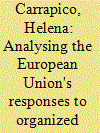

|
|
|
|
|
| Publication |
2014.
|
| Summary/Abstract |
In the past 30 years, organized crime (OC) has shifted from being an issue of little, or no concern, to being considered one of the key security threats facing the European Union (EU), the economic and political fabric of its society and its citizens. The purpose of this article is to understand how OC has come to be understood as one of the major security threats in the EU, by applying different lenses of Securitization Theory (ST). More specifically, the research question guiding this article is whether applying different ST approaches can lead us to draw differing conclusions as to whether OC has been successfully securitized in the EU. Building on the recent literature that argues that this theoretical framework has branched out into different approaches, this article wishes to contrast two alternative views of how a security problem comes into being, in order to verify whether different approaches can lead to diverging conclusions regarding the same phenomenon. The purpose of this exercise is to contribute to the further development of ST by pointing out that the choice in approach bears direct consequences on reaching a conclusion regarding the successful character of a securitization process. Starting from a reflection on ST, the article proceeds with applying a "linguistic approach" to the case study, which it then contrasts with a "sociological approach". The article proposes that although the application of a "linguistic approach" seems to indicate that OC has become securitized in the EU, it also overlooks a number of elements, which the "sociological approach" renders visible and which lead us to refute the initial conclusion.
|
|
|
|
|
|
|
|
|
|
|
|
|
|
|
|
| 2 |
ID:
189386
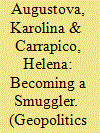

|
|
|
|
|
| Summary/Abstract |
Migrants’ involvement in smuggling increases alongside restricted cross-border movement and violent borders, yet this dynamic is usually examined from migrants’ position as clients. In this article, we move away from migrants and smugglers as two separate roles and question migrants’ aspirations to and experiences of resorting to smuggling networks as workers in the context of EU land borders, where direct violence is used daily to fight cross-border crime. By doing so, we move further the examination of fluid relations in smuggling provisions and the way they are intertwined with care and exploitation, as shaped and circumscribed by violent borders. The article illustrates the intersections between border violence and migrants’ active involvement in smuggling by drawing on the case study of an anonymised Border Town and multi-site, multi-author fieldwork from Serbia and Bosnia. By questioning migrants’ experiences of shifting roles from clients to service providers, and by taking into account their work in smuggling provision, we show that, in a situation of protracted vulnerability orchestrated by border violence, state and law enforcement, the categories – “migrant” and “smugglers” – can blur.
|
|
|
|
|
|
|
|
|
|
|
|
|
|
|
|
| 3 |
ID:
187081
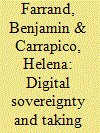

|
|
|
|
|
| Summary/Abstract |
In recent years, we have been able to observe the emergence and mainstreaming of an EU discourse on digital sovereignty, which highlights the importance of gaining back control of EU digital infrastructure and technological production, based on the EU's perceived loss of economic competitiveness, limited capacity to innovate, high degree of dependence on foreign digital infrastructures and service providers and, related to all these factors, difficulty in providing EU citizens with a high level of cybersecurity. Bearing in mind that a considerable percentage of these infrastructures and service providers are under private sector control, the present article asks how this sovereignty discourse conceptualises the role of the private sector in EU cybersecurity. Drawing from a Regulatory Capitalism theoretical model, this article proposes that the EU has instead entered a Regulatory Mercantilist phase where it seeks to reassert its control over cyberspace, impose digital borders, accumulate data wealth and reduce its dependence on external private sector actors whose values may not reflect those of the EU order. A new approach to cybersecurity is emerging, in which the non-EU private sector can be perceived as much of a threat as foreign powers, and from whom digital sovereignty must be secured.
|
|
|
|
|
|
|
|
|
|
|
|
|
|
|
|
| 4 |
ID:
187076
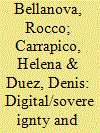

|
|
|
|
|
| Summary/Abstract |
The notion of digital sovereignty, also often referred to as technological sovereignty, has been gaining momentum in the European Union’s (EU) political and policy discourses over recent years. Digital sovereignty has come to supplement an already substantial engagement of the EU with the digital across various security policy domains. The goal of this article and of the overall Special Issue is to explore how the discourse and practices of digital sovereignty redefine European security integration. Our core argument is that digital sovereignty has both direct and indirect implications for European security as the EU attempts to develop and control digital infrastructures (sovereignty over the digital), as well as the use of digital tools for European security governance (sovereignty through the digital). It is thus essential to further explore digital sovereignty both in terms of European policies and of a re-articulation of sovereign power and digital technologies – what we suggest calling digital/sovereignty.
|
|
|
|
|
|
|
|
|
|
|
|
|
|
|
|
| 5 |
ID:
107829
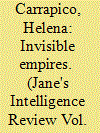

|
|
|
|
|
|
|
|